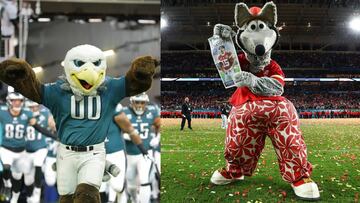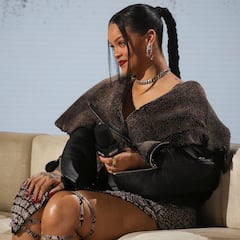2023 Super Bowl: What is the controversy around the Kansas City Chiefs mascot?
Why is the Kansas City Chiefs mascot a controversial figure in the sport?


The Super Bowl LVII is about to get underway but first let’s get to the real business: K.C. Wolf and his 85 inch hips.
KC Wolf was ‘born’ in 1989, back when the NFL didn’t have a lot of popular mascots. He was named after the team’s ‘Wolfpack’, a group of loud fans who sat in the Municipal Stadium.
Dan Meers has been the man behind the wolf mask for 33 years and keeps his wolf bodies in his garage. ““KC Wolf has probably got a better wardrobe than I’ve got”, he told local news. He became a huge favourite amongst the fans after bringing a sense of joy to the role, regularly breaking out in fun dance moves and an avid Chiefs fan. Wolf’s most iconic moment is undoubtedly when he tackled a drunk fan who wandered onto the field in the 2001 Pro Bowl. He also has a strong social media presence, with over 19,000 followers.
It’s been another stressful summer #KCWolf #LakeRat #ChiefsKingdom pic.twitter.com/kfmlrTzTmW
— KC Wolf 👀 (@kcwolf) July 27, 2021
Underlying controversy
However, despite the love, there is a sense of controversy behind the character and Kansas City’s identity designs and branding as a whole. As reported in Distractify, “native American groups across the nation have asked various sports teams, such as the Washington Commanders (formerly the Washington Redskins) and baseball team the Cleveland Guardians (formerly the Cleveland Indians), to change their team names and mascots to reduce harm and cultural appropriation.”
Before KC Wolf, the Chiefs’ mascot was a pinto horse mascot named Warpaint, who was brought back in 2009, before being quickly retired as “it was the right thing to do”, according to the team.
Kansas City Chiefs’ controversial identity
The fans, who sing the Tomahawk Chop, have been banned since 2020 from wearing face paint and Native American headdresses, with the team saying that “face painting is still allowed for all fans, but any face paint that is styled in a way that references or appropriates American Indian cultures and traditions will be prohibited.”
#StopTheChop was floated by activists in order to turn the fans away from doing the gesture, but the club, perhaps worried about losing the ferocious atmosphere the fans are known for, decided to respond by recommending the chop be done with a closed fist instead of an open palm.
Related stories
The Chiefs official website makes no mention of the controversy, simply stating that Wolf “is also in high demand as a humorous and motivational speaker.”
- More detail: Why the Tomahawk Chop is so controversial
Rhonda LeValdo, founder of the Kansas City-based Indigenous activist group Not In Our Honor, said on Thursday that “it’s not bringing our people into this celebration together. Really, it’s hurting us more because now it’s the bigger spotlight where you’re seeing this all over the world.” She will be in Arizona to push for the Chiefs to abandon the team’s name, mascot and fan-driven “tomahawk chop.”


